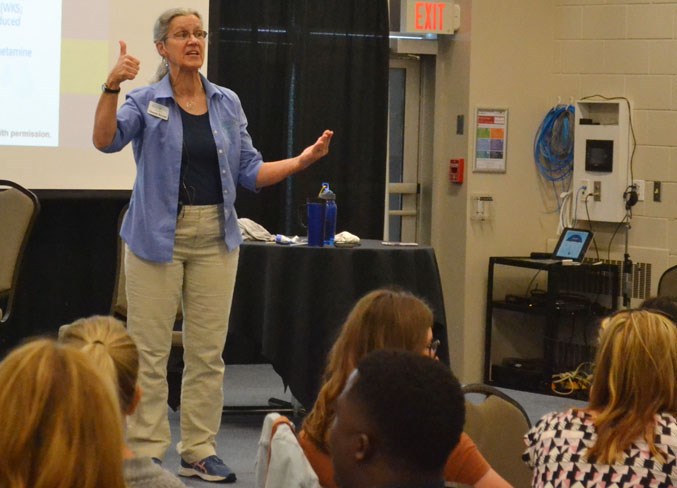The Olds College Alumni Centre was absolutely packed for a dementia care workshop organized by Sundre's Greenwood Neighbourhood Place (GNP) and facilitated by Teepa Snow, an internationally renowned dementia expert.
GNP is a non-profit charitable organization, formed in 2000 by members of the Sundre community. Its purpose is to strengthen the community by promoting collaboration and volunteerism among residents of all ages.
That help includes promoting education on dementia and support for those suffering from the disease and those who care for them.
At least 350 people attended the event, held July 29-31. In addition to people from Olds and Sundre, it attracted many attendees from Edmonton and some from as far away as Saskatchewan. People from B.C. and the U.S. also expressed interest.
Attendees included caregivers of those with dementia as well as doctors, nurses, occupational therapists and social workers.
"We had a whole family (attend) actually that have one family member who is struggling," said GNP chair Delores Dercach.
It was the first big workshop GNP had ever taken on.
"We ended up selling out in early April and then we had a waiting list and then we stopped even taking names for the waiting list because we couldn't accommodate all of the people who were really quite begging to go," organizing committee chair Cindy Andrus said.
On its website, the Alzheimer Society defines dementia as "a set of symptoms that are caused by disorders affecting the brain."
Symptoms may include memory loss and difficulties with thinking, problem-solving or communicating, to the point where that person's everyday activities may be impaired. A person with dementia may also experience changes in their mood or behaviour.
The society says dementia is "progressive, which means the symptoms will gradually get worse as more brain cells become damaged and eventually die."
GNP volunteers began organizing the workshop about 15 months ago because Snow is in such demand that she gets booked up extremely rapidly.
Dercach and Andrus say attendees learned a lot during the workshop.
For example, Dercach said, "one of the key issues is how imperative it is for all of us to separate the disease of dementia from the actual person. That's huge."
Andrus agreed.
"Caregivers oftentimes will blame the person for their behaviours and not understand that it's the disease that's causing the behaviours or the actions that they happen to be doing," she said.
"Sometimes it can be physical aggression, verbal aggression, just repeating the same things over and over; making things in the home difficult to navigate.
"So oftentimes the caregivers will blame the person and not understand it has nothing to do with the person but it's the disease that's causing it."
"For example, when somebody is suffering from dementia, they might become very aggressive and grab at you and stuff like that. So often, the response of the caregiver or the family member is to get angry," Dercach said.
"Or let's say I've told you something and five minutes later you ask me again, my initial response is to say, 'mom, I already told you that half a dozen times. Stop it already.' And that's not helpful for the person who is suffering from dementia."
Snow told those attending the workshop that not everyone should be a caregiver for people living with dementia.
There's good reason for that, Dercach said.
"Some people are able to manage everything that's required and other people are just not built that way and they never will be built that way, and that's OK," she said.
Snow also recommended that attendees do a baseline self assessment to determine how they're doing now, so they can determine if there have been any changes in things like cognitive abilities in, say, a year from now.
"Teepa made it perfectly clear that changes start occurring anywhere between eight and 10 years prior to family and friends really noticing that there has been a change, which I found amazing," Dercach said.
Andrus was asked if GNP might offer the workshop again because of the strong interest it attracted.
"Well, we certainly had requests. People were asking already when we were going to bring her back," she said.
However, she said GNP will likely take a breather for at least a couple of months before deciding whether to take that job on again.
"But you're right; there is a huge need in the community. It's a large gap and because senior populations are increasing exponentially because of the baby boomers, this has become a very hot topic and a very concerning issue worldwide, really," she added.




